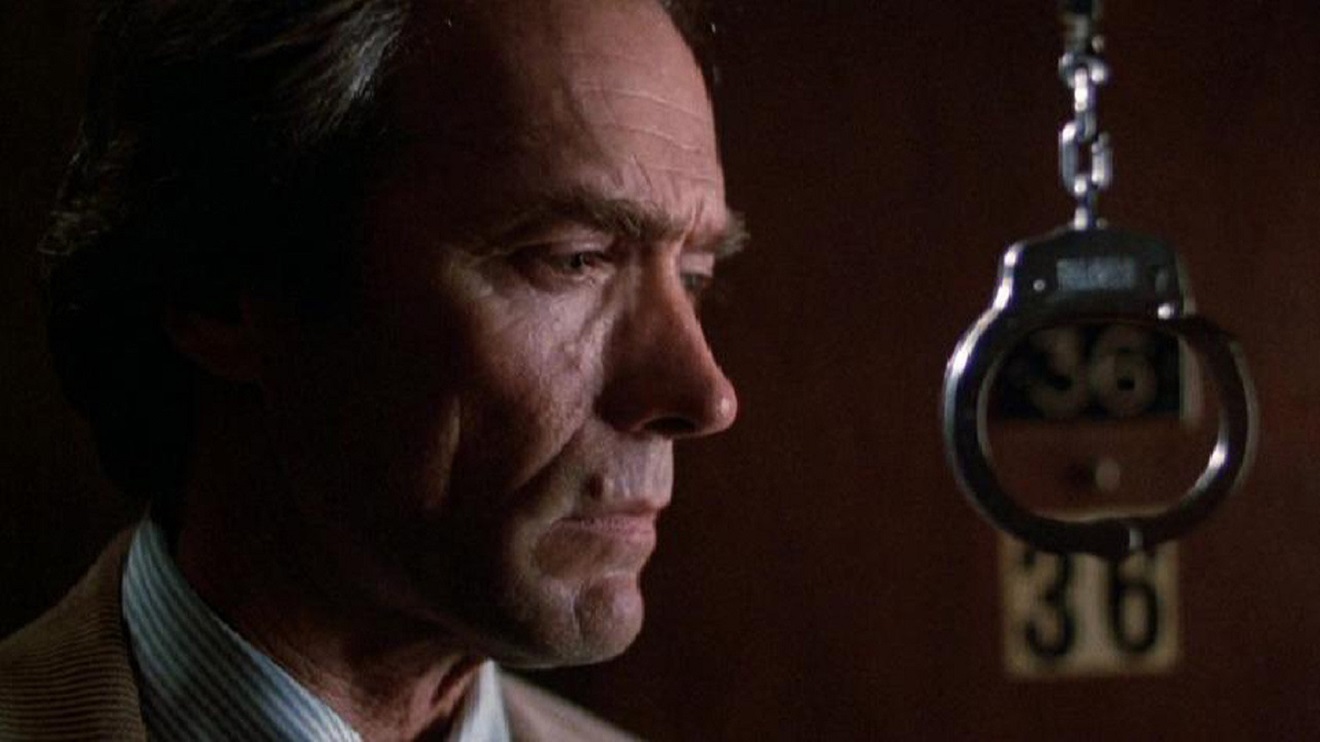
Long before Louisiana started offering massive tax credits to attract Hollywood productions, the state was a popular setting for crime dramas. Some played off the haunting atmosphere of the bayous (e.g., the mediocre adaptations of James Lee Burke’s Dave Robicheaux novels, Heaven’s Prisoners and In the Electric Mist) whereas others were built around New Orleans’ pervasive corruption (e.g., The pretty good Dennis Quaid-Ellen Barkin romance/thriller, The Big Easy). The underappreciated 1984 Clint Eastwood vehicle Tightrope effectively exploits (in every sense) a different local cultural feature, namely the sleazier side of the sex trade that has existed in New Orleans long before Storyville because a synonym for a red light district.
The plot: Police detective Wes Block (Clint) has been unmoored since his wife abandoned him and his daughters (Jenny Beck and Clint’s real life daughter, Alison). Loving and attentive with his daughters by day, at night Block has for reasons that he can’t fully understand begun visiting prostitutes that he can sexually dominate. Block’s psychological turmoil takes on new dimensions when he is assigned to catch a serial killer who takes his fetish to deadly extremes. Meanwhile, a strong, intelligent, women’s rights advocate (Geneviève Bujold) pressures Block to respond more effectively to the threat the killer poses, and unnerves him in other ways as well. A brutal crime story and descent into emotional darkness follow.
The “cop in crisis” has been done a million times before, and is usually short-handed in a fashion that will not alienate the audience, most commonly by showing him drinking too much. “We are not so very different, you and I” is another movie staple, for example showing that both the lead police investigator and the master criminal are both smart, obsessive people. If that’s all this film had done, it would have been a serviceable but unremarkable crime drama. What makes Tightrope special is Clint Eastwood’s willingness to challenge his millions of fans by having his character wallow in muck: He’s not just drinking too much, he’s handcuffing prostitutes so that he can control them during sex. And he’s not similar to the killer only because both are smart and obsessive, but because both of their heads are psychosexual snake pits. The only parallel level of risk taking by a major international star I know of along these lines is Sean Connery’s stellar work in another of my recommendations, The Offence.
The legendary William Goldman said that a basic rule of screenwriting was that “stars will not play weak and they will not play blemished.” But every rule has exceptions. Going as far back as the flawed but intriguing 1971 film The Beguiled continuing through the multi-Oscar winning Unforgiven and up to the present day (e.g., Gran Torino, The Mule) Eastwood has never been afraid to “play blemished.” That’s a key reason why his career has been so much more artistically varied and impressive than all those Hollywood actors who only portrayed strong-jawed paladins.

The other thing that raises this film about countless other police thrillers are the female characters and the high level at which they are written and performed. Alison Eastwood isn’t just the star’s kid, she’s a fine actress and her scenes with her father have authentic emotional power. They also fill out the character of Wes Block by showing that while he’s not different from the killer in having hostile feelings towards women, he is quite different in also experiencing more tender emotions towards them. Bujold, who appeared in too few films for an actress of her talent, is also excellent here. Because she is strong enough to vulnerable with Block, and sees his own fear of being hurt, she gets under his skin in a way nothing else does. I also love that rather than portraying her as a damsel in distress, the script makes her heroic in her direct confrontation with the killer.
Richard Tuggle’s script has a few missteps here and there but is generally first-rate, putting a fresh spin on the tropes of the genre. He also got the screen credit for director, but this sure looks and feels like an Eastwood film. According to Richard Shickel’s biography of Eastwood, Tuggle had never directed a movie before and was extremely tentative on set, leading Tuggle and Eastwood to amicably work out a co-directing arrangement. Whatever precisely happened in that regard, the result is compelling.
Reaction to Tightrope was mixed when it played in theaters, with some people finding it too seedy and dark (literally and figuratively) but others appreciating the strong acting and neo-noir tone. I am very much in the latter camp, and would put Tightrope up there with Bronco Billy as Eastwood’s best work of the 1980s.
